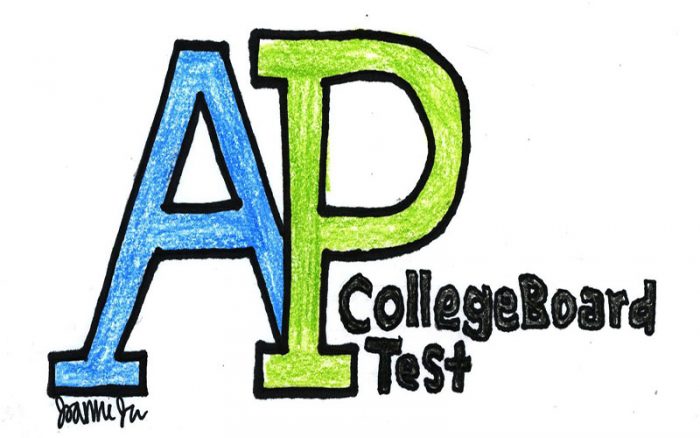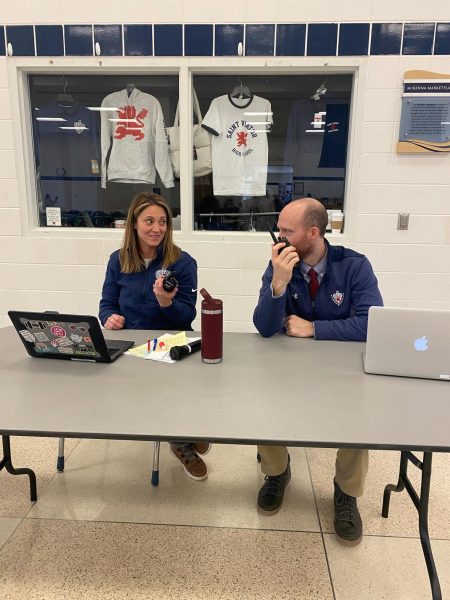Students, teachers look ahead to AP exams
As the last three months of school approach, students find themselves switching from study mode to how-long-until-break mode. However, the work is not over quite yet. The AP exams are nearing, and both students and teachers are starting to prepare.
The AP exams begin on May 1, but the preparation begins well before that. Truthfully, preparation for the exams begins on the first day of class, which go on to build the foundation of information. For some classes, it even begins as early as the summer homework.
“This [AP exam] is not just something added at the end of the course but is embedded throughout the year,” said Mrs. Maureen Martin, who teaches AP World History and AP European History.
Therefore, the tests and homework of AP classes essentially act as the preparation for the exam. Because there are over 15 different AP classes, there are endless ways that teachers get students ready.
“I go to a conference in the fall and find out what is new for AP Physics to help tailor the curriculum to new topics,” said the AP Physics C teacher Mrs. Cate Majka. “I think it is important to keep on top of the subject matter.”
The College Board, which administers the exams, also puts out information from the exams of previous years. Teachers and students can use this information to get a sense of what the AP exams will be testing for.
For example, throughout the year, the AP Human Geography class works on free response questions (FRQs) put out by the College Board from past exams.
“The FRQs in class will help us a lot as they will simulate an FRQ for the exam and help us prepare for the different topics,” said sophomore Kiana Resch.
Because of all of the information available about the AP exams, students are encouraged to find methods that suit their individual learning styles. Some of the popular methods include investing in test prep books or visiting websites such as getafive.com or the College Board website. Organizing a study group early in the school year is yet another method.
Sophomore Maggie Cane spoke on how she is preparing for the upcoming AP Human Geography exam.
“I just keep everything that we get throughout the year, like all the old notes, assignments and things like that in one binder so that it’s all there, organized by chapter when I need it,” said Cane.
During the school year, the methods teachers use include weekly multiple choice questions, timed writing tests and practice problems. By progressively incorporating AP material in this way, teachers aim for students to think along the lines of the AP grading scale rather than the grading scale used in class.
Instead of focusing on getting every question completely correct, Mrs. Majka gave more helpful advice.
“Do what you can do and go to the next one,” said Mrs. Majka
As the testing days approach, classwork becomes increasingly targeted toward AP preparation material. Many teachers aim to complete teaching the materials necessary for the exams by April and then spend the time leading up to the exam as a review.
“We use April to review,” said AP Calculus teacher Mrs. Cheryl Nowak. “We focus on concepts that were more challenging and concepts that the students may have forgotten over the course of the year.”
Additionally, some classes have daily reviews, such as short quizzes, and others have review sessions outside of school. Although some of the ways teachers are beginning to review are traditional methods, many others are introducing informal review methods, such as review games.
“I reviewed the quizzes Mrs. Martin gave us in class in preparation for the test,” said sophomore Nicole Durso, who took the AP World History exam last year. “I found those the most helpful.
As challenging and frustrating as AP exams may seem, the work put in is rewarded through college credit and experience.
“The intensity of the course is nice preparation for college and creates a less stressful transition [to college],” said AP Language and Composition teacher Ms. Annette Bochenek.
In the end, it is all about the effort the student is willing put into studying. Teachers provide all the materials necessary to get a 5 on the AP exam.
“For the best possible outcome, students should become active and engaged learners in the class, focusing on the content and actively making connections, not just focusing on the test,” said Mrs. Martin.
Your donation will support the student journalists of Saint Viator High School. Your contribution will allow us to purchase equipment and cover our annual website hosting costs.







